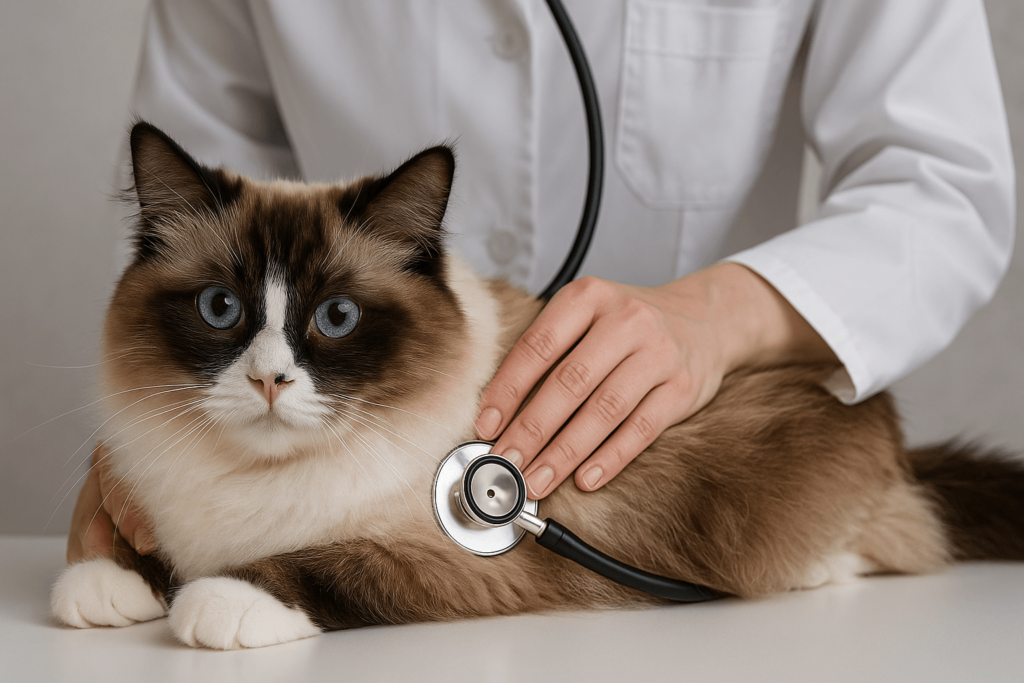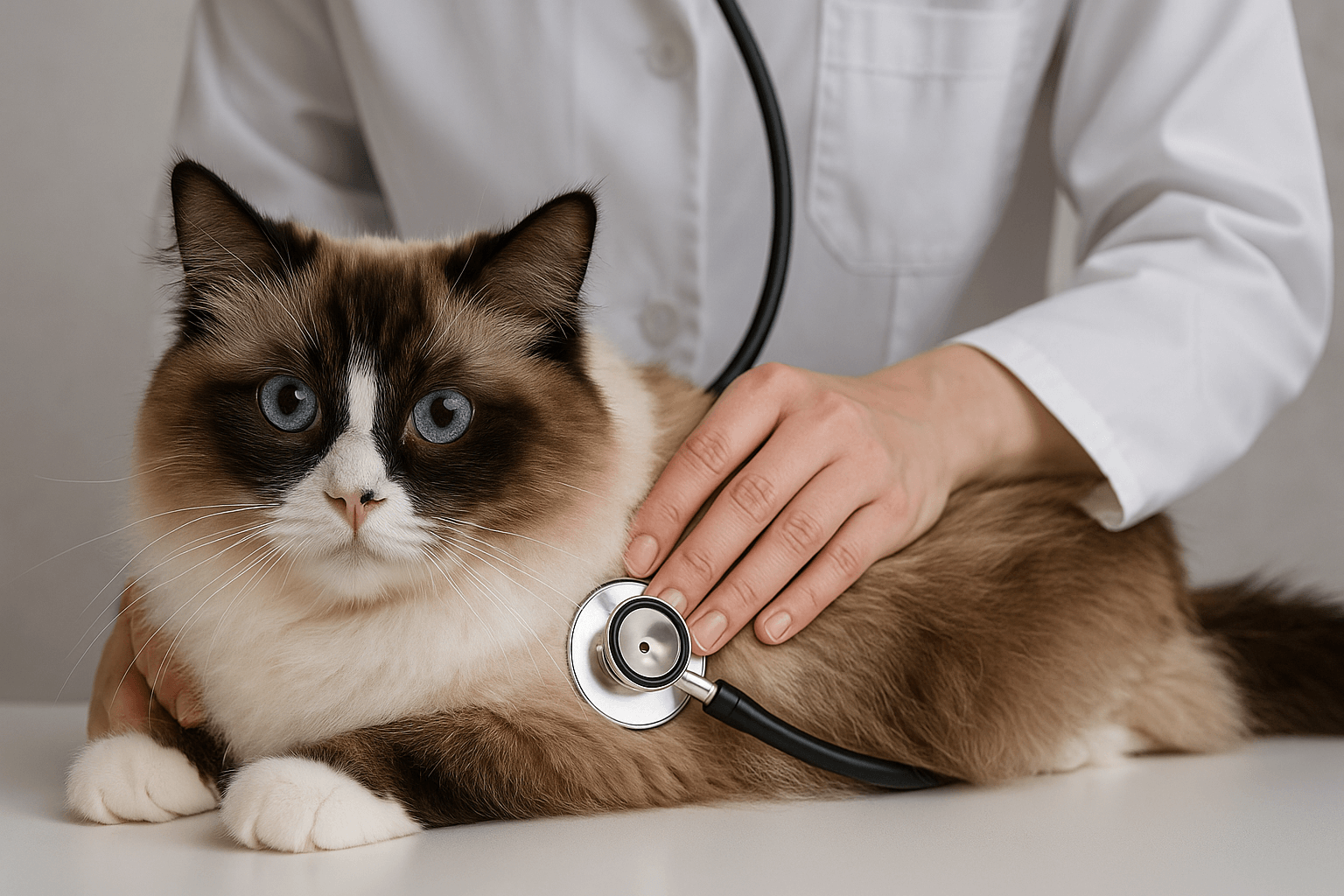Ragdoll Cat Health Issues: What Every Owner Should Know
Ragdoll cats are beloved for their striking blue eyes, silky coats, and gentle, affectionate personalities. These feline companions are known to form strong bonds with their owners, often earning the nickname “puppy cats” due to their dog-like loyalty. However, like all breeds, Ragdolls are prone to certain health issues that potential and current owners should be aware of. Understanding these conditions can help you provide the best care possible and ensure your Ragdoll lives a long, happy life. In this guide, we’ll explore common health concerns, preventive measures, and tips for maintaining your Ragdoll’s well-being.
Common Health Issues in Ragdoll Cats
Ragdolls are generally healthy cats, but they do have a predisposition to certain genetic and acquired conditions. Recognizing these issues early can make a significant difference in managing your cat’s health effectively.
Hypertrophic Cardiomyopathy (HCM):
This is the most common heart disease in Ragdolls, characterized by an abnormal thickening of the heart muscle. Regular veterinary check-ups can help detect HCM early.Polycystic Kidney Disease (PKD):
A hereditary condition where cysts develop in the kidneys, potentially leading to kidney failure. Genetic testing can identify carriers of the PKD gene.Bladder Stones:
Ragdolls are prone to urinary tract issues, including bladder stones, which can cause discomfort and require medical intervention.Obesity:
Due to their laid-back nature, Ragdolls are at risk of becoming overweight, which can lead to diabetes, arthritis, and other health problems.Gingivitis and Dental Disease:
Poor dental hygiene can result in gum inflammation and tooth decay, impacting your cat’s overall health.
By staying informed about these potential health concerns, you can take proactive steps to safeguard your Ragdoll’s well-being.

Preventive Measures to Keep Your Ragdoll Healthy
Prevention is key to minimizing the risk of health issues in Ragdoll cats. With proper care and attention, many conditions can be managed or avoided altogether.
Regular Veterinary Check-Ups:
Schedule annual or biannual visits to monitor your cat’s health and catch any issues early.Genetic Testing:
If you’re adopting a Ragdoll kitten, ensure the breeder has performed genetic testing for conditions like HCM and PKD.Balanced Diet:
Feed your Ragdoll high-quality food tailored to their age, weight, and activity level to prevent obesity and support overall health.Hydration:
Encourage water intake by providing fresh water daily or investing in a cat water fountain to reduce the risk of urinary issues.Dental Care:
Brush your cat’s teeth regularly or provide dental treats and toys to maintain oral hygiene and prevent gum disease.
Taking these preventive measures can significantly enhance your Ragdoll’s quality of life and reduce the likelihood of serious health problems.
Check this guide 👉Bengal Cat Health Problems: Best 7 Expert Tips!
Check this guide 👉Sphynx Cat Health Issues: Best 7 Expert Tips!
Check this guide 👉Himalayan Cat Health Issues: Best 7 Expert Tips!
Health Issue | Preventive Action |
|---|---|
Hypertrophic Cardiomyopathy (HCM) | Schedule regular vet check-ups |
Polycystic Kidney Disease (PKD) | Test for genetic markers before adoption |
Bladder Stones | Ensure proper hydration and diet |
Obesity | Monitor portion sizes and encourage play |
Gingivitis and Dental Disease | Practice routine dental care |
Signs of Health Problems to Watch For
Early detection of health issues is crucial for effective treatment. Familiarize yourself with these warning signs to ensure your Ragdoll receives prompt care.
Lethargy or Changes in Behavior:
If your usually active Ragdoll becomes unusually lazy or withdrawn, it could indicate an underlying issue.Difficulty Urinating:
Straining to urinate or frequent trips to the litter box may signal urinary tract problems or bladder stones.Weight Loss or Gain:
Sudden changes in weight can point to metabolic disorders, dental issues, or other health concerns.Labored Breathing:
Rapid or heavy breathing may be a sign of heart disease, such as HCM, requiring immediate attention.Bad Breath or Drooling:
These symptoms often accompany dental problems and should not be ignored.
By recognizing these signs early, you can address potential health concerns before they escalate into more serious conditions.
How to Support Your Ragdoll’s Emotional Well-Being
A Ragdoll’s physical health is closely tied to their emotional state. Providing a nurturing environment helps them thrive both mentally and physically.
Provide Companionship:
Ragdolls crave human interaction—if you’re away frequently, consider adopting another pet to keep them company.Create a Safe Space:
Offer cozy hiding spots or elevated perches where your Ragdoll can retreat when feeling stressed.Engage in Playtime:
Use interactive toys to stimulate your cat’s mind and body, reducing boredom and preventing obesity.Stick to a Routine:
Ragdolls thrive on consistency—maintain regular feeding, grooming, and play schedules to minimize stress.Monitor Stress Levels:
Signs of anxiety include excessive grooming or hiding. Address stressors promptly to prevent behavioral issues.
A happy Ragdoll is a healthy Ragdoll, and supporting their emotional needs is just as important as addressing their physical health.
Common Misconceptions About Ragdoll Health
Many myths surround Ragdoll cat health, leading to confusion among owners. Clarifying these misconceptions ensures better care for your feline friend.
“Ragdolls Don’t Need Exercise”:
While they’re less energetic than some breeds, Ragdolls still need playtime to stay fit and avoid obesity.“All Ragdolls Develop Heart Disease”:
Not all Ragdolls will develop HCM; genetic testing and monitoring can reduce risks significantly.“Their Long Fur Requires Minimal Grooming”:
Despite its silky texture, Ragdoll fur mats easily without regular brushing.“They’re Too Fragile for Families”:
Ragdolls are sturdy cats who enjoy family life, though supervision around young children is recommended.“Indoor Cats Don’t Get Sick”:
Even indoor Ragdolls can develop health issues, so preventive care remains essential.
Understanding these truths helps dispel myths and promotes responsible ownership.
Tips for Choosing a Reputable Ragdoll Breeder
Adopting a Ragdoll from a reputable breeder reduces the risk of inheriting health problems. Here’s what to look for:
Genetic Testing Practices:
Ensure the breeder conducts genetic tests for HCM, PKD, and other breed-specific conditions.Clean Living Environment:
Visit the facility to confirm cleanliness, proper nutrition, and socialization practices for kittens.Transparency About Health History:
A trustworthy breeder will openly share health records and answer questions honestly.Kitten Socialization:
Well-socialized kittens adapt better to new homes and exhibit fewer behavioral issues.Membership in Breed Organizations:
Membership in groups like The International Cat Association (TICA) indicates adherence to ethical breeding standards.
Choosing a responsible breeder sets the foundation for a healthy, happy Ragdoll.
How to Prepare for Vet Visits with Your Ragdoll
Routine vet visits are vital for maintaining your Ragdoll’s health, but preparation can make the experience smoother for both you and your cat.
Bring Necessary Supplies:
Pack your Ragdoll’s carrier, favorite blanket, and any medications they may need during the visit.Update Vaccination Records:
Keep vaccination and health records organized to share with your vet during appointments.Practice Carrier Training:
Acclimate your Ragdoll to their carrier beforehand to reduce stress during transport.Note Behavioral Changes:
Document any unusual behaviors or symptoms to discuss with your veterinarian.Stay Calm During Appointments:
Cats pick up on their owner’s emotions—staying calm reassures your Ragdoll and makes the visit less stressful.
Proper preparation ensures productive vet visits and strengthens your partnership with your cat’s healthcare provider.
Frequently Asked Questions About Ragdoll Cat Health
Are Ragdolls prone to specific diseases?
Yes, Ragdolls are more susceptible to conditions like HCM, PKD, and bladder stones. Genetic testing can help identify risks.
How can I prevent obesity in my Ragdoll?
Provide a balanced diet, control portion sizes, and encourage regular exercise through playtime.
What should I do if my Ragdoll has trouble urinating?
Contact your veterinarian immediately, as this could indicate a urinary blockage or infection.
How often should I groom my Ragdoll?
Ragdolls have semi-long fur that requires brushing 2-3 times a week to prevent matting and hairballs.
Can Ragdolls live long lives despite health issues?
With proper care, regular vet visits, and early intervention, Ragdolls can live up to 15 years or more.
Ensuring a Long, Happy Life for Your Ragdoll
While Ragdoll cats are prone to certain health issues, knowledge and proactive care can mitigate risks and enhance their quality of life. By staying vigilant, scheduling regular vet visits, and providing a loving, supportive environment, you can ensure your Ragdoll remains a cherished companion for years to come. Remember, a healthy Ragdoll is a happy Ragdoll—and their unwavering affection will reward you every step of the way.
Dog Tapeworm Life Cycle: Best 7 Expert Tips! – Learn how tapeworms infect dogs, spot symptoms, and break the cycle with expert prevention strategies.
Anxious Cat Body Language: Best 7 Expert Tips! – Learn to spot signs of stress, understand triggers, and help your cat feel safe and relaxed.
Anxious Dog Body Language: Best 7 Expert Tips! – Learn to spot signs of anxiety, respond effectively, and help your dog feel safe and secure.
Is Breeding Dogs Bad? Best 7 Expert Tips! – Explore the ethics, benefits, and risks of dog breeding to make informed decisions for a better future.





